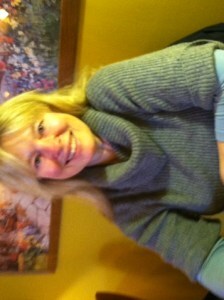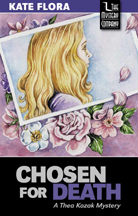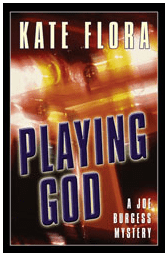An Alligator Hide over a Baby-Soft Soul
Kate Flora: I’ve been sitting in the writer’s chair now for almost thirty-nine years, ten of them spent in the grueling sadness of the unpublished writer’s corner. I’ve been up, as in, “Oh my gosh, my agent just got me a three-book hard/soft deal.” I’ve been down, way down, after being dropped by a terse e-mail from my editor (yes, seriously) six books into writing a series I loved. I’ve been way up when a book went to auction, got a six figure advance, and became a book club selection. I’ve been way down when the sales figures for an award-winning book didn’t earn out the tiny advance I was paid. There are some interesting lessons I’ve taken away from all of this.
them spent in the grueling sadness of the unpublished writer’s corner. I’ve been up, as in, “Oh my gosh, my agent just got me a three-book hard/soft deal.” I’ve been down, way down, after being dropped by a terse e-mail from my editor (yes, seriously) six books into writing a series I loved. I’ve been way up when a book went to auction, got a six figure advance, and became a book club selection. I’ve been way down when the sales figures for an award-winning book didn’t earn out the tiny advance I was paid. There are some interesting lessons I’ve taken away from all of this.
First, and something I always share with my writing students, is that a writer has to believe in her own work and affirmatively own her right to call herself a writer. The world of publishing, and the task of getting published, can be brutal. Often, the message from the universe is that your work sucks and you suck and anything you can think of has already been done, and better by someone else. Give it up, dreamer, you should go do something else. In order to get through the harsh message days, the days of silence when your book is out for consideration, or the words “no thanks” scribbled in pencil next to a coffee stain on your manuscript, to stay in the chair being the creative storyteller you are, a writer has to believe that she’s entitled to write, that her writing has value. She has to have faith that the writing will improve. She has to love the process more than the notion of “being published.” And she has to work assiduously to become the best possible writer she can be so that it gets harder and harder to reject her.
This does not mean stubborn adherence to the idea that the work is always great. We all have a lot to learn from our beta readers and from our editors. A great editor (or editorial agent) can make a writer better and a story stronger. If readers aren’t getting your character or your story, it’s important to listen to that and to figure out why.
The beauty of this business is that the learning never ends.
 I’ve learned (after I picked myself up off the floor and wiped my eyes) that sometimes being dropped can be the best thing that can happen, because it made me take chances. If my Thea Kozak series hadn’t been dropped (it was subsequently picked up by another publisher) I wouldn’t have started taking chances. Those chances led me to writing my Portland, Maine-based Joe Burgess police procedural series. Taking chances meant joining Susan Oleksiw and Skye Alexander in forming Level Best Books, and the amazing satisfaction of publishing crime story collections (including two Edgar nominees) and putting many first-time authors in print.
I’ve learned (after I picked myself up off the floor and wiped my eyes) that sometimes being dropped can be the best thing that can happen, because it made me take chances. If my Thea Kozak series hadn’t been dropped (it was subsequently picked up by another publisher) I wouldn’t have started taking chances. Those chances led me to writing my Portland, Maine-based Joe Burgess police procedural series. Taking chances meant joining Susan Oleksiw and Skye Alexander in forming Level Best Books, and the amazing satisfaction of publishing crime story collections (including two Edgar nominees) and putting many first-time authors in print.
If I hadn’t decided not to let someone else decide whether I was a writer, I might have gone back to practicing law. Instead, I’ve collaborated on true crime and other nonfiction projects that let me use my legal training and my writing skills while also letting me help others put wings on their dreams.
Along the way, I’m trying to pay forward in appreciation of the generosity I was given by

The Joe Burgess series begins with Playing God
my Sisters in Crime and other writers when I was starting out. When I knew nothing about promotion, my sisters were there, teaching me how to do an effective public presentation (inviting, whereas the law can be adversarial) and how to be a good citizen on a panel. In particular, the amazing B.A. Shapiro taught me how to be a good citizen on a panel, and mentor the writers coming after me. I’ve mentored dozens of writers, tried to help them stay strong when the messages from the world were unkind, and celebrated when they sold books.
I’ve learned that it’s hard, but we shouldn’t give up. We should be survivors. If they vote us off the island, we have to just swim back. Inside, most of us are tender, baby-soft souls. Solitary, curious observers who take what the world gives us and weave it into story. We wonder what makes the people around us who they are, what shapes them, and what makes them deviate from the social compact so that they allow themselves to commit crimes. To do that, and survive in the world of publishing outside ourselves, we often need to don our alligator-hide cloaks, and to be reminded, as Sisters in Crime tells us: You write alone but you’re not alone.
A former assistant attorney general for the State of Maine in the areas of child abuse and child support enforcement, Kate is a founding member of the New England Crime Bake and Maine Crime Wave conferences. She has served as editor and publisher of Level Best Books and as international president of Sisters in Crime.
Lea Wait's Blog
- Lea Wait's profile
- 506 followers



